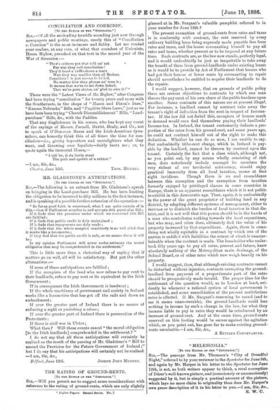THE RATING OF GROUND-RENTS. [To THE EDITOR OF THE "
SIDECTATOR."] Sut,—Will you permit me to suggest some considerations with reference to the rating of ground-rents, which are only slightly " Diem° Paws. &coati Series. No. 7.
glanced at in Mr. Sargant's valuable pamphlet referred to in your number for June 12th ?
The present exemption of ground-rents from rates and taxes is in conformity with contract, the rent reserved by every ordinary building lease being expressly made payable free from rates and taxes, and the lessee covenanting himself to pay all rates and taxes, whether present or to be imposed at any future time. Such contracts are, as the law now stands, perfectly legal, and it would undoubtedly be just as inequitable to take away the benefit of them from ground-landlords under existing leases as it would be to provide by Act of Parliament that lessees who had got their houses at lower rents by covenanting to repair should nevertheless be entitled to require their landlords to do the repairs.
I would suggest, however, that on grounds of public policy there are serious objections to contracts by which one man throws the payment of his own share of the public burdens upon another. Some contracts of this nature are at present illegal. For instance, a landlord cannot by contract take away the tenant's right of deduction from the rent in respect of Income- tax. If the law did not forbid this, occupiers of houses much in demand. would soon find themselves paying their landlords' Income-tax. In Ireland, the tenant customarily deducts a pro- portion of the rates from his ground-rent, and some years ago, he could not contract himself out of the right to make this deduction. Whether he can do so now, I am unable to say. But undoubtedly tithe-rent charge, which in Ireland is pay- able by the landlord, cannot be thrown by contract upon the tenant. Certainly the fact that a class which, although not, as you point out, by any means wholly consisting of rich men, does notoriously include amongst its members the very richest of our territorial aristocracy, should enjoy practical immunity from all local taxation, seems at first sight invidious. Though there is no real resemblance between this exemption and the exemption from taxation formerly enjoyed by privileged classes in some countries in Europe, there is an apparent resemblance which it is not politic to exhibit in this democratic age. Then, again, it is undoubtedly in the power of the great proprietor of building land in any district, by adopting different systems of management, either to increase or to diminish the burden of local taxation in that dis- trict, and it is not well that this pewee should be in the hands of a man who contributes nothing towards the local expenditure, but who may, and often does, ultimately find the value of his property increased by that expenditure. Again, there is some- thing not wholly equitable in a contract by which one of the parties is saddled with liabilities the extent of which is unascer- tainable when the contract is made. The leaseholder who under- took fifty years ago to pay all rates, present and future, knew absolutely nothing of the Metropolitan main drainage, of the School Board, or of other rates which now weigh heavily on his property.
I would suggest, then, that although existing contracts cannot be disturbed without injustice, contracts exempting the ground- landlord from payment of a proportionate part of the rates should be prospectively made invalid. The proper time for the settlement of the question would, as to London at least, evi- dently be whenever a rational system of local government is established, and some consolidation of the present multifarious rates is effected. If Mr. Sargant's reasoning be sound (and to me it seems unanswerable), the gronnd-landlords could lose nothing in income by such a change in the law, for what they became liable to pay in rates they would be reimbursed by an increase of ground-rent. And at the same time, ground-rents reserved on this footing would be secure against the agitation which, as you point out, has gone far to make existing ground- rents unsaleable.—I am, Sir, &c., A RETIRED CONVEYANCER.




































 Previous page
Previous page